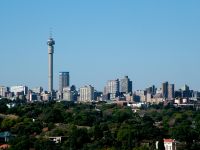In 2010, South Africa quietly snuck into that group of developing economies formerly known as the BRIC nations [an acronym formed from Brazil, Russia, India, China], appending an “S” to the end of “BRIC” in the process. The World Bank’s report on GDP in the following year places South Africa 27th out of 193 countries surveyed, and the nation currently accounts for a staggering fourth of the resource-rich African continent’s total GDP. The country’s economic viability in the post-apartheid era is becoming the subject of more and more high-profile discussions, with its mineral-laden terrain and busy mining industry remaining highly profitable. A new influx of professional expatriates to the country from Europe, Asia and the Americas seems highly likely.
However, expatriates’ first encounter with South Africa in the popular media may focus on decidedly different metrics of national health and prosperity. Take, for example, the Academy Award-winning 2005 film Tsotsi, shot on location in Johannesburg, whose action centers on a young street hooligan who accidentally kidnaps a woman’s baby in a car theft gone horribly awry. This film, complemented by similar studio films and amateur documentaries, shines an uncomfortably glaring light on the problems challenging any long-term goals for South African prosperity.The fact that a Wikipedia search for “crime in S…” auto-completes itself as “crime in South Africa” is not a very promising indicator, and indeed there is no getting around this aspect of South African life. Violent crimes are an area of major concern: homicides for the country can reach up to 50 a day, placing it first in NationMaster’s 2006 country survey, while this same survey places it 4th in drug-related offenses and 5th in “total crimes” (one bright spot of the otherwise mordant report is that South Africa’s car theft rate lags somewhat behind the first place United States). As one report notes, “the distinctive feature of crime in South Africa is not its volume, but its violence.”
Why South Africa?
Though it is not specifically stated how these statistics affect the future economic growth of, and investment in, the region, economic disparity is presently one of the major engines of criminal activity in the country. Unemployment in South Africa is a major concern, with around 17% of the total population unable to find work, and with 24% of that unhappy group claiming that they have given up on finding work entirely. The nation’s proximity to destitute Zimbabwe has also led to South Africa’s absorption of refugees from that area, which contributes to an additional group of desperate job seekers. This feeds into not only the violent crime rate mentioned above, but a significant ‘underground economy’ characterized both by trade in contraband goods and by the well-publicized “419 scams” and other confidence tricks.
The local security industry
One effect of the crime rate in South Africa has been the rapid expansion of the private security industry – easily one of the world’s most lucrative – which supplements a South African Police Service [SAPS] that many consider to be woefully underfunded, and which has become heavily criticized for its violent quelling of the 2012 Marikana miners’ strike. Multinational corporations (e.g. Chubb) are heavily involved in the provision of security services from basic guard duty to armed response, and in fact this presents a high employment opportunity for expats with military or defense industry experience. Even if you are not in their employ, it is well worth it to research the capabilities of the different services and what they can do to protect your home and ensure safe transport to and from important business trips. It may provide some solace to know that these units are sometimes better armed and trained than some nations’ standing armies.
If you are a high-income earner in Pretoria or the Johannesburg metro area, you will most likely be in a gated / “access controlled” or otherwise fortified neighborhood staffed by a private security force. Many of these communities are typified by perimeter walls that are difficult to scale, barred windows, and numerous means of getting in touch with your local tactical response units. The creation of “restricted access” measures, for the suburbs of Pretoria and elsewhere, has involved protracted court battles with city councils, but has eventually resulted in the fortification of suburbs like Brunaly and Lynnwood Manor.
Is it really that bad?
On the bright side, some of the worst-case scenarios predicted for SA crime have failed to materialize. Many cynical commentators pointed to the 2010 FIFA World Cup proceedings in the country, for example, as a moment in which the collapse of the country into criminality would be televised for all to see, and that a pandemic of rioting and victimization of tourists would mar the games. Though hardly unaccompanied by controversy, the games proceeded with significantly less mayhem than was predicted by skeptical observers.
This suggests, perhaps, a nation that realizes when the stakes are at their highest, and can respond with coordinated police and civilian crime prevention efforts. As to the latter, numerous crime prevention and awareness sites are popping up online with no affiliation to the SA government or police services (see, for example, www.crimeoutloud.co.za). These enable the discussion of crime problems in a frank manner that jettisons the polarizing, explicitly racial agenda of many such discussions, and focuses on across-the-board safety. The middle classes of the new South Africa cut across racial lines, and the growing recognition that everyone must contribute to the crime prevention is presenting a possible point of reconciliation among once competitive groups.

